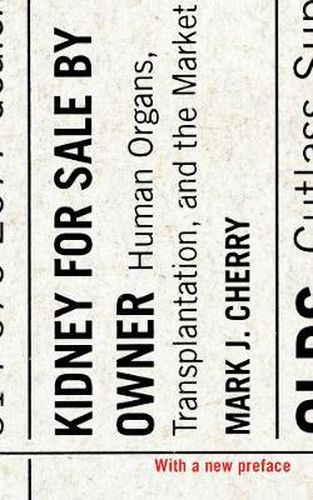Readings Newsletter
Become a Readings Member to make your shopping experience even easier.
Sign in or sign up for free!
You’re not far away from qualifying for FREE standard shipping within Australia
You’ve qualified for FREE standard shipping within Australia
The cart is loading…






Over the past decade in the United States, nearly 6,000 people a year have died waiting for organ transplants. In 2003 alone, only 20,000 out of the 83,000 waiting for transplants received them - in anyone’s eyes, a tragedy. Many of these deaths could have been prevented, and many more lives saved, were it not for the almost universal moral hand wringing over the concept of selling human organs. Bioethicist Mark Cherry explores the why of these well-intentioned misperceptions and legislation and boldly deconstructs the roadblocks that are standing in the way of restoring health to thousands of people. If most Americans accept the notion that the market is the most efficient means to distribute resources, why should body parts be excluded? Kidney for Sale by Owner contends that the market is indeed a legitimate - and humane - way to procure and distribute human organs. Cherry stakes the claim that it may be even more just, and more compatible with many Western religious and philosophical traditions, than the current charity-based system now in place. He carefully examines arguments against a market for body parts, including assertions based on the moral views of John Locke, Immanuel Kant, and Thomas Aquinas, and shows these claims to be steeped in myth, oversimplification, and contorted logic. Rather than focusing on purported human exploitation and the irrational moral repugnance of selling organs, Cherry argues that we should focus on saving lives. Following on the thinking of the philosopher Robert Nozick, he demonstrates that, with regard to body parts, the important core humanitarian values of equality, liberty, altruism, social solidarity, human dignity, and, ultimately, improved health care are more successfully supported by a regulated market rather than by well meant but misguided, prohibitions.
$9.00 standard shipping within Australia
FREE standard shipping within Australia for orders over $100.00
Express & International shipping calculated at checkout
Over the past decade in the United States, nearly 6,000 people a year have died waiting for organ transplants. In 2003 alone, only 20,000 out of the 83,000 waiting for transplants received them - in anyone’s eyes, a tragedy. Many of these deaths could have been prevented, and many more lives saved, were it not for the almost universal moral hand wringing over the concept of selling human organs. Bioethicist Mark Cherry explores the why of these well-intentioned misperceptions and legislation and boldly deconstructs the roadblocks that are standing in the way of restoring health to thousands of people. If most Americans accept the notion that the market is the most efficient means to distribute resources, why should body parts be excluded? Kidney for Sale by Owner contends that the market is indeed a legitimate - and humane - way to procure and distribute human organs. Cherry stakes the claim that it may be even more just, and more compatible with many Western religious and philosophical traditions, than the current charity-based system now in place. He carefully examines arguments against a market for body parts, including assertions based on the moral views of John Locke, Immanuel Kant, and Thomas Aquinas, and shows these claims to be steeped in myth, oversimplification, and contorted logic. Rather than focusing on purported human exploitation and the irrational moral repugnance of selling organs, Cherry argues that we should focus on saving lives. Following on the thinking of the philosopher Robert Nozick, he demonstrates that, with regard to body parts, the important core humanitarian values of equality, liberty, altruism, social solidarity, human dignity, and, ultimately, improved health care are more successfully supported by a regulated market rather than by well meant but misguided, prohibitions.